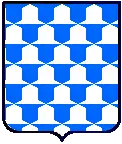vair
English

Vair
Etymology
From Middle English veir, veire, from Old French vair, veir, from the accusative singular masculine form of Latin varius (“variegated”).
Pronunciation
- (UK) IPA(key): /vɛə/, /vɛː/
- Rhymes: -ɛə(ɹ)
Noun
vair (countable and uncountable, plural vairs)
- (archaic) A type of fur from a squirrel with a black back and white belly, much used on garments in the Middle Ages.
- 1999, George RR Martin, A Clash of Kings, Bantam 2011, p. 323:
- Bran wore grey breeches and white doublet, his sleeves and collar trimmed with vair.
- 1999, George RR Martin, A Clash of Kings, Bantam 2011, p. 323:
- (heraldry) An heraldic fur formed by a regular tessellation of blue and white bell shapes.
Related terms
Translations
heraldic fur
Dutch
Etymology
From Old French vair, veir, from the accusative singular masculine form of Latin varius (“variegated”).
Pronunciation
Audio (file)
French
Etymology
From Old French vair, veir, from the accusative singular masculine form of Latin varius.
Further reading
- “vair” in le Trésor de la langue française informatisé (The Digitized Treasury of the French Language).
Gallo
Verb
vair
- To see
- Disez-mai don, v'ez-ti pas veü un jiene là tout à l'oure ?
- Please tell me, have you seen a young man there few minutes ago ?
- Disez-mai don, v'ez-ti pas veü un jiene là tout à l'oure ?
Middle English
Old French
Adjective
vair m (oblique and nominative feminine singular vaire)
- changeable; that may change
- multi-colored; polychromatic
- shining; brilliant
Declension
This article is issued from Wiktionary. The text is licensed under Creative Commons - Attribution - Sharealike. Additional terms may apply for the media files.